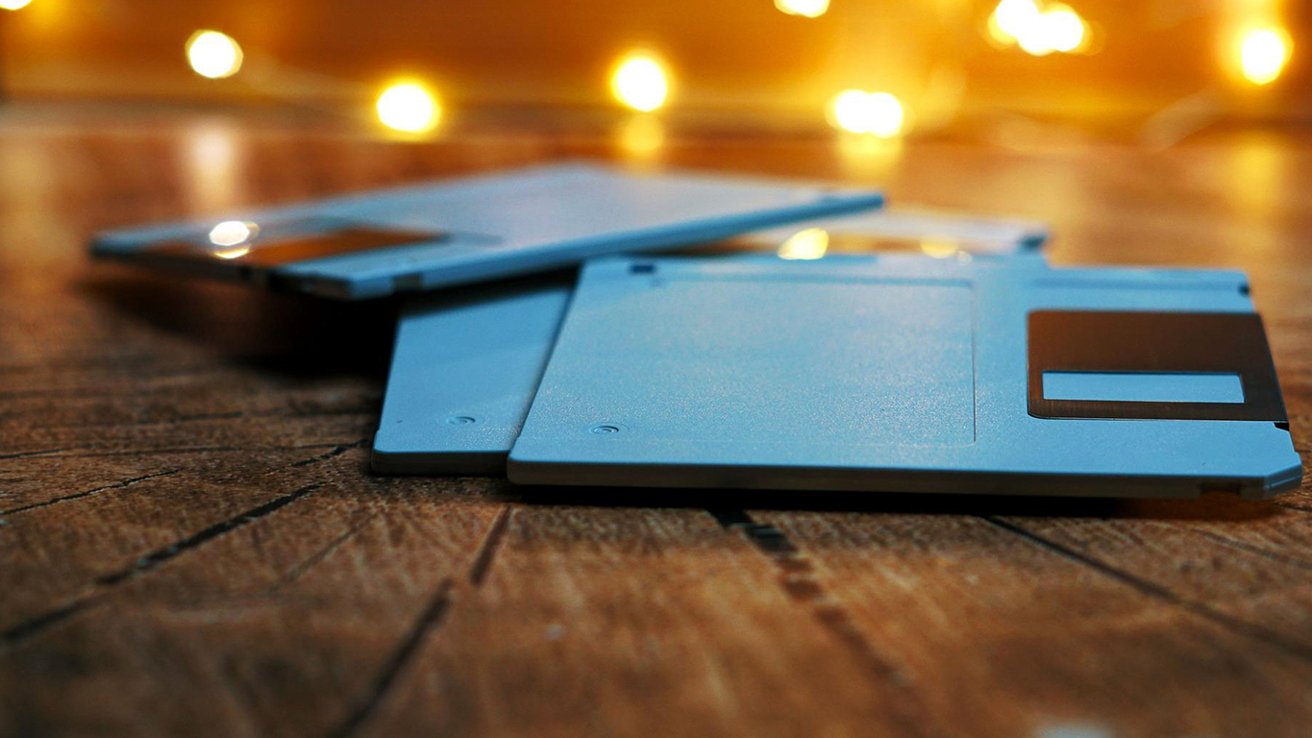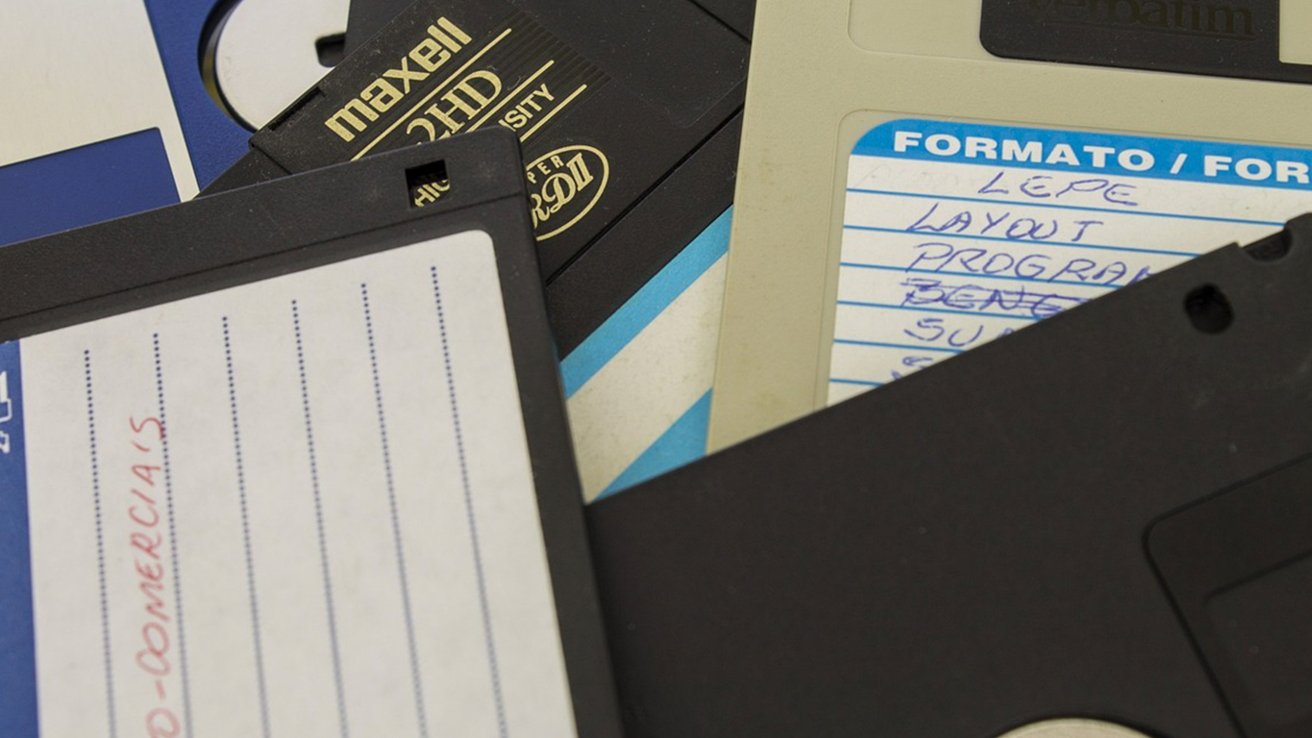24 years after original iMac, there's still big demand for floppies
The iMac was the first mass-produced computer to ditch the 3.5-inch floppy disk, and the rest of the industry followed soon after -- but that doesn't mean there isn't a market for them.

While the floppy disk reigned supreme for nearly 40 years, Apple chose to abandon the format in 1998, when it introduced the iMac G3. The company believed that user-writeable CDs, high-speed networking, and the internet would render the disks obsolete.
And, to a degree, that's true. By 2006, the 3.5-inch floppy disk was decidedly legacy. By 2015, it was nearly extinct.
But, even though no modern devices offer a floppy disk drive, there's still a healthy market for them.
Eye On Design spoke to Tom Persky, owner of floppydisk.com. He's the self-proclaimed "last man standing in the floppy disk business."
Persky didn't intend on being the last bastion for those looking to get their hands on blank floppy disks. It just happened as he survived -- and bought from -- competitors.
He initially got his start duplicating floppy disks. He notes that copying disks in the '80s and '90s was "as good as printing money."
However, as the floppy disk fell out of use, he found a new market -- selling blank disks. After big-box retailers quit carrying them, Persky quickly became the go-to for those who wanted to get their hands on the disks.

"So here I am, a small company with a floppy disk inventory, and I find myself to be a worldwide supplier of this product," Persky says in an interview. "My business, which used to be 90% CD and DVD duplication, is now 90% selling blank floppy disks. It's shocking to me."
AppleInsider is aware that until recently, the US Department of Defense was a heavy user of 3.5-inch floppy disks. A smattering of systems requiring 5.25-inch disks were taken off service in about 2015.
In 2022, a significant portion of Persky's customers are hobbyists, often wanting to purchase a couple dozen disks at a time. His largest current customer base, however, is industrial users.
"These are people who use floppy disks as a way to get information in and out of a machine. Imagine it's 1990, and you're building a big industrial machine of one kind or another," he explains. "You design it to last 50 years and you'd want to use the best technology available. At the time this was a 3.5-inch floppy disk."
Persky notes that many industrial users are in aviation and the medical industry. He suspects that the most significant industrial user is the embroidery business.
He doesn't think the demand for floppy disks will ever entirely die out, though he doesn't expect them to see the same fervor as vinyl.
"Floppy disks are going to be a little bit more like buggy whips or typewriters. They're going to be a collectible marvel of their time. Imagine how hard it would be to manufacture a new typewriter today."
"There are a number of American authors who talk about the fact that they can only write on a typewriter. It's something very important to them that is tied into their artistic genius," he muses. "I think that floppy disks are going to be a little bit like that. You're not going to be able to replace them."
Present pricing for floppy disks are About $15 for an unused 10-pack, and $50 and up for a 50-pack. Recycled floppy disks can be had for as little as $20 for 50 disks.
Read on AppleInsider

While the floppy disk reigned supreme for nearly 40 years, Apple chose to abandon the format in 1998, when it introduced the iMac G3. The company believed that user-writeable CDs, high-speed networking, and the internet would render the disks obsolete.
And, to a degree, that's true. By 2006, the 3.5-inch floppy disk was decidedly legacy. By 2015, it was nearly extinct.
But, even though no modern devices offer a floppy disk drive, there's still a healthy market for them.
Eye On Design spoke to Tom Persky, owner of floppydisk.com. He's the self-proclaimed "last man standing in the floppy disk business."
Persky didn't intend on being the last bastion for those looking to get their hands on blank floppy disks. It just happened as he survived -- and bought from -- competitors.
He initially got his start duplicating floppy disks. He notes that copying disks in the '80s and '90s was "as good as printing money."
However, as the floppy disk fell out of use, he found a new market -- selling blank disks. After big-box retailers quit carrying them, Persky quickly became the go-to for those who wanted to get their hands on the disks.

"So here I am, a small company with a floppy disk inventory, and I find myself to be a worldwide supplier of this product," Persky says in an interview. "My business, which used to be 90% CD and DVD duplication, is now 90% selling blank floppy disks. It's shocking to me."
AppleInsider is aware that until recently, the US Department of Defense was a heavy user of 3.5-inch floppy disks. A smattering of systems requiring 5.25-inch disks were taken off service in about 2015.
In 2022, a significant portion of Persky's customers are hobbyists, often wanting to purchase a couple dozen disks at a time. His largest current customer base, however, is industrial users.
"These are people who use floppy disks as a way to get information in and out of a machine. Imagine it's 1990, and you're building a big industrial machine of one kind or another," he explains. "You design it to last 50 years and you'd want to use the best technology available. At the time this was a 3.5-inch floppy disk."
Persky notes that many industrial users are in aviation and the medical industry. He suspects that the most significant industrial user is the embroidery business.
He doesn't think the demand for floppy disks will ever entirely die out, though he doesn't expect them to see the same fervor as vinyl.
"Floppy disks are going to be a little bit more like buggy whips or typewriters. They're going to be a collectible marvel of their time. Imagine how hard it would be to manufacture a new typewriter today."
"There are a number of American authors who talk about the fact that they can only write on a typewriter. It's something very important to them that is tied into their artistic genius," he muses. "I think that floppy disks are going to be a little bit like that. You're not going to be able to replace them."
Present pricing for floppy disks are About $15 for an unused 10-pack, and $50 and up for a 50-pack. Recycled floppy disks can be had for as little as $20 for 50 disks.
Read on AppleInsider


Comments
https://www.bbc.co.uk/news/world-asia-62749310
It wasn't that long ago that various technical committees came to the conclusion that the best long term archival medium was still paper.
Technology will forge ahead and leave behind trails of 'dead' technology that makes it virtually impossible to access data down the road. The process is normal but legislation should be present to protect access to the older hardware and file formats.
All 'first world' problems but problems nevertheless.
NASA ran into huge problems trying to access data from some Apollo missions and even today the problem of 'digital legacies' is only beginning to be looked at by the various digital 'gatekeepers'. Legislation will catch up to that too at some point.
Migration is an option but a bad one as it does not protect against the problems I detailed. Just ask NASA and many other organisations.
And migration leads to... migration.
That is not a reasonable solution as it effectively defeats the purpose of archival usage itself and entails huge additional cost. That overlap period typically sees higher costs for the newer technology.
It would be far easier to simply offer small quantities of hardware to protect against data death. Just like has happened with some floppy disk hardware.
Cloud technology has moved part of the problem into the hands of service providers but how many of us really know what protections are in place for our cloud stored data?
Mine is on cloud infrastructure and deemed to be up to 99.999999999% secure with redundancy and measures in place to migrate data off of facilities in case of disaster.
It all gets complicated very quickly and most people aren't aware of the implications.
I recall spending hours, yes HOURS, downloading 1MB files over a 56k dial-up connection. It would fail and I'd have to start over again. Someone probably picked up a phone in the house.
These days are so different.
My OMG frame of reference for where storage was "back then" to where it is today is the realization that my first PC's entire storage capacity (hard disk) would only be adequate to store 2-4 music files. Imagine a 25-30 lb computer set up as a "media server" - for playing 3 songs. I hope you like those 3 songs a lot.
That is on point - good on you - lots of data is also stored on tapes - VHS style - Them BiG Boyz. Until all of that data goes 100 percent digital, the world will lose lots of data - I forget the author but he wrote extensively about it - a google search will get you there.